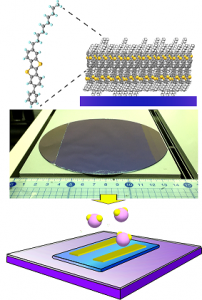B01-01 : Development of molecular recognition sensors using single molecular bilayers of organic semiconductors
Summary
| Leader | Shunto Arai (The University of Tokyo) |
|---|
 Self-assembled nature of organic small molecules is expected to realize low-cost and resource-saving manufacturing of organic electronic devices. Artificial single molecular bilayers (SMBs) are especially considered to result in versatile applications such as soft molecular recognition sensors replacing olfactory and taste functions. These functions were considered to be specific for living organisms, and difficult to realize using inorganic materials so far. Contrary to the expectations for industrial applications, artificial SMBs formed via self-assembly of usual amphiphilic molecules have strictly limited their practical use because of the inherent instability and fragility associated with the weak intermolecular interactions. We thus have recently developed a new methodology to form large-area, uniform, and self-organized SMBs using extended π-conjugated frameworks asymmetrically substituted by alkyl chains (see Figure). The thickness of fabricated SMBs is ca. 5 nm and the ultra-thin nature of SMBs accounts for their mechanical flexibility. The obtained SMBs also exhibited efficient carrier transport as channels of thin-film transistors, reflecting strong intralayer π-π interactions and the concomitant highly layered-crystalline nature. In this project, we will engage in the development of molecular recognition sensors using these ultra-soft SMBs similar to biological membranes. Here we especially focus on the development of polar gas sensors using thin-film transistor-type devices. Additionally, we will collaborate with the other groups taking part in this project by providing electronic components fabricated on flexible substrates.
Self-assembled nature of organic small molecules is expected to realize low-cost and resource-saving manufacturing of organic electronic devices. Artificial single molecular bilayers (SMBs) are especially considered to result in versatile applications such as soft molecular recognition sensors replacing olfactory and taste functions. These functions were considered to be specific for living organisms, and difficult to realize using inorganic materials so far. Contrary to the expectations for industrial applications, artificial SMBs formed via self-assembly of usual amphiphilic molecules have strictly limited their practical use because of the inherent instability and fragility associated with the weak intermolecular interactions. We thus have recently developed a new methodology to form large-area, uniform, and self-organized SMBs using extended π-conjugated frameworks asymmetrically substituted by alkyl chains (see Figure). The thickness of fabricated SMBs is ca. 5 nm and the ultra-thin nature of SMBs accounts for their mechanical flexibility. The obtained SMBs also exhibited efficient carrier transport as channels of thin-film transistors, reflecting strong intralayer π-π interactions and the concomitant highly layered-crystalline nature. In this project, we will engage in the development of molecular recognition sensors using these ultra-soft SMBs similar to biological membranes. Here we especially focus on the development of polar gas sensors using thin-film transistor-type devices. Additionally, we will collaborate with the other groups taking part in this project by providing electronic components fabricated on flexible substrates.
